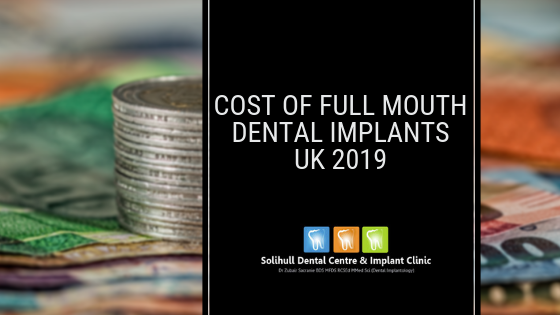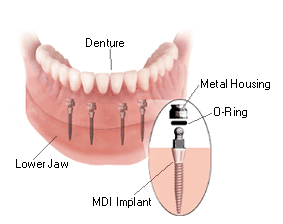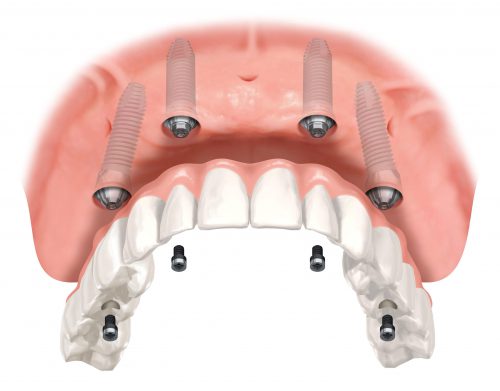
Are you missing all of your teeth?
Do you have dentures that currently move around when you eat?
Then full mouth dental implants could be an option for you. Full mouth dental implants can be used to either replace a full set of missing teeth with a fixed bridge or stabilise an existing loose or wobbly denture.
Why do people get dental implants?
We’ve written before about the consequences of not replacing missing teeth . With full mouth dental implants many people consider dentures first, however there are a few advantages of having traditional implants rather than just a simple denture.
- Dental implants can support the bone in the area where teeth have been lost thereby reducing the amount of bone resorption.
- Implants provide a rigid basis on which to create a brand-new set of teeth, whether this be a denture or dental bridge.
- Because they have a more rigid base it makes eating far easier.
- Because implant restorations are more stable than basic dentures it means there is less chance of embarrassment that is sometimes caused when a regular dentures move about during smiling or talking.
What are full mouth implants?
Dental implants themselves don’t actually restore any teeth at all, the implants provide a substructure or frame on which to support the teeth that you see. Depending on the number of implants (substructures) used governs the way that you’re missing teeth are replaced.
Here’s a simple list of what full mouth implants are and how they might be used:
- 2-4 Dental implants – 2 would usually be the minimum required in order to replace all of your teeth. Usually the implants would be placed where your eye teeth were (canines), these implants would support little pop studs which would stick up on your gums (the dental implants would be completely concealed within your gums). A full denture would then click onto these pop studs.

- 4-6 Implants – if you had more dental implants fitted then you may be able to have a fixed bridge. This is where the dentist screws a fixed bridge made of either metal and porcelain or zirconia onto the dental implant heads. You won’t be up to remove the bridge yourself but it can be removed by the dentist for regular maintenance.

What we describe here is a very basic summary of full mouth dental implants, there are other slight modifications to the techniques above depending upon your exact clinical situation.
What are the pros and cons of dental implants?
Full mouth dental implant pros:
- They support the surrounding bone and can prevent bone resorption.
- They support the final restoration to ensure it stays in rigidly during eating, smiling and in everyday life.
Full mouth dental implant cons:
- Can need more maintenance than regular denture.
- Will almost certainly be more expensive in the short term than a regular denture.
The process for having full mouth dental implants
The process for having a full mouth dental implant treatment will vary significantly depending on your exact situation. The dental implant procedure will often be undertaken by a range of healthcare professionals including, but not limited to:
- Your referring dentist (sometimes this dentist may place the implants themselves).
- The dental implant dentist.
- A periodontics specialist who may perform more specialised bone grafting procedures.
- A dental laboratory who will be making the implant retained which or denture.
- The dental implant manufacturer who may get involved in the design and planning stage to work out which implant from their range is best.
- A dental hygienist that will help you with post operative care to help you clean and maintain a dental implant.
All of these people work together, sometimes in different dental clinics to ensure you have the best dental care. The procedure will, however usually be along the following lines:
- An initial consultation with your dental implant dentist. Some practices offer a free dental implant consultation.
- Initial impressions of the top and bottom to work out the relationship between the jaws and begin diagnostic stages.
- Possible CT scan in order to work out position, density and quality of the bone.
- Possible computer aided design stages to work out where the implants are going to be.
- Bite registration in order to work out the relationship and distance between the top and bottom jaw.
- Mock up of how you may look once the implants are placed.
- Creation of a surgical spent from the mockup in order to guide the dental implant surgeon to place the implants in the right place.
- Dental implant surgery to put the dental implants into your mouth.
- Healing phase, anywhere between three and six months.
- Checking of the mockup to ensure that everything is okay.
- Construction of the final dental bridge or denture. This process may take a month or so depending upon the complexity.
- Various tryings of the final bridge or denture throughout the manufacturing process to ensure that each stage is accurate prior to proceeding to the next. Then maybe three or four different stages and visits to the surgery during this process.
- Final fitting of the final bridge or denture (false teeth).
- Follow-up to ensure everything is okay.
How long does it take for dental implants?
It can often take a year from initial discussion to final restoration to have a full mouth dental implant bridge or denture so it’s worth beginning the process as early as you can.
What are the alternative options?
The first option in any situation within dentistry is to do nothing, this is sometimes the best option depending upon your situation. However, if you know that you want to restore a full mouth of missing teeth then the options are usually:
- A dental bridge fixed and fully supported on the implants.
- A denture which clicks into the mouth on the implants.
- A hybrid. This can often be a bar which sits in your mouth and is permanently fitted to the implants. Over the top of this bar clips a removable bridge.
The cost of full mouth dental implants
And so, we come on to the thrust of this blog post which is about the cost of dental implants. As you can see there are a wide range of alternatives and possibilities. You may need to have extensive bone grafting or treatments such as a sinus lift in order to create enough bone in which to place the dental implant. These are additional surgical treatments which is difficult to give prices for at the beginning as it depends upon the complexity.
As a general guide, the cost of full mouth dental implants in the UK will be along the following lines:
- Initial dental implant consultation £100
- initial diagnostic stages for study models and x-rays £100
- bone grafting from £500
- Full denture retained by two implants from £3500
- Fixed full arch bridge from £9000
As you can see the treatment is not especially cheap however, consider it against the cost of a car.
- the average cost of a small car in the UK is up to £12,715.
- the average car lasts for 8 years
- The average car is used for only 4% of the time!
Compare this to the cost of full mouth dental implants:
- The average cost in the UK is from £9000
- The average lifespan of a dental bridge is 15 years
- Your teeth are used 100% of the time. These are not only used whilst you are eating, they are used to keep your face supported to keep you looking good. Many people also use their teeth at night as they grind.
Most people would consider finance to purchase a car and indeed finances usually available for dental implants also, making them and affordable option for many people.
We do hope you have found this in-depth blog post about the cost of full mouth dental implants both informative and educational, please do let us know your comments below.
Zubair Sacranie
Latest posts by Zubair Sacranie (see all)
- Can Dental Implants Fail, And What Are The Reasons For Failure? - 31st August, 2025
- Teeth Whitening Solihull: We Answer Your Questions - 1st July, 2025
- What To Do When Half Your Tooth Breaks Off? - 31st March, 2025


